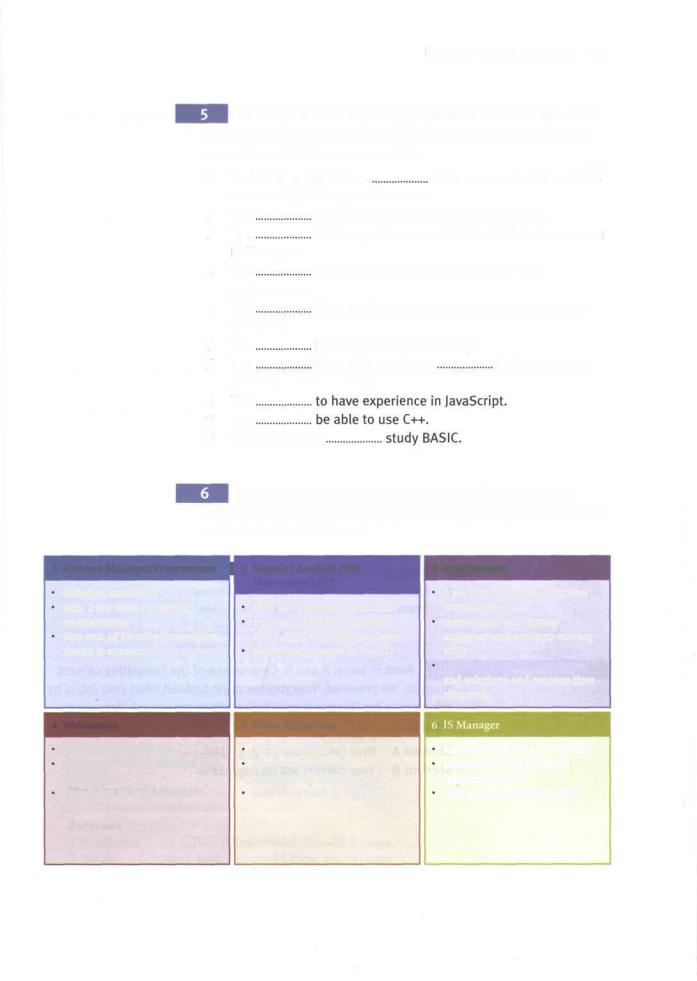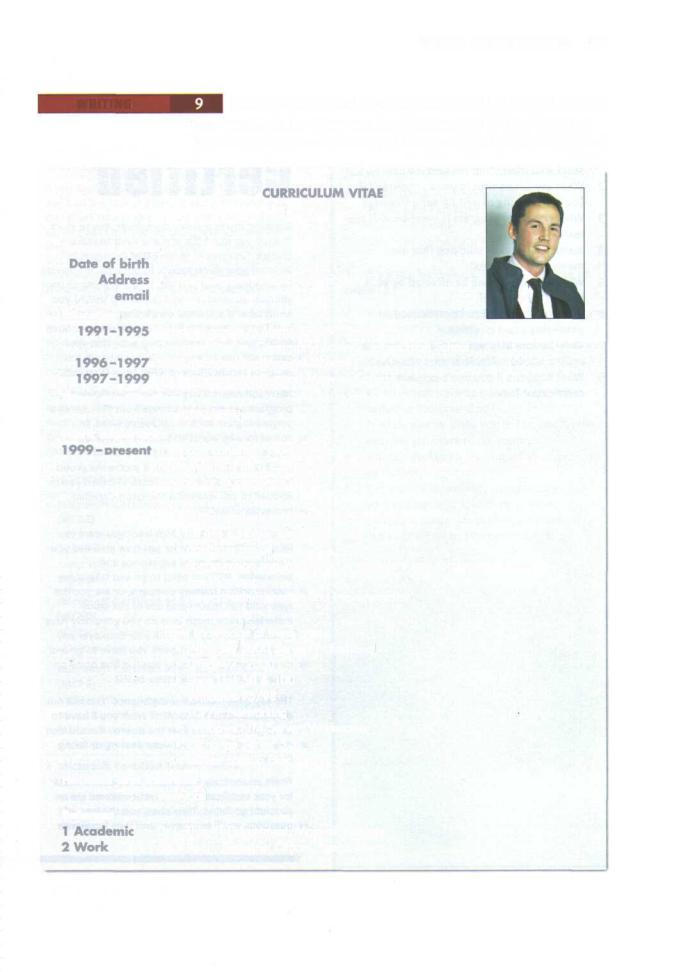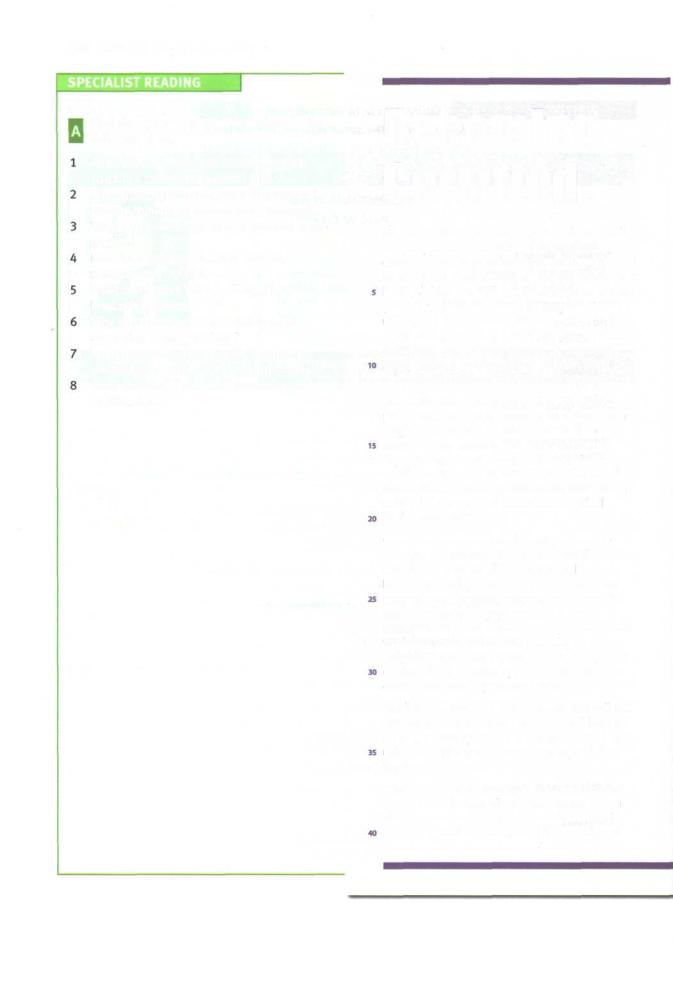
Oxford English for Information Technology / unit22
.pdf
UNIT 22
People in Computing
|
STARTER |
What do the following people in computing do? Compare |
|
answers with your partner. |
|
|
1 |
Webmaster |
|
2 |
Help-desk troubleshooter |
|
3 |
Applications programmer |
|
4 |
Security specialist |
|
5 |
Systems programmer |
|
READING |
Work in groups of three: A, B and C. Read your text and |
|
complete this table. You may not find information for each section of |
|
|
your table. |
|
|
|
B |
1 |
job title |
|
2 |
nature of work |
|
3 |
formal qualifications |
|
4 |
personal qualities |
|
5 |
technical skills |
|
6 |
how to get started |
|
7 |
how to make progress |
|
How to become a programming expert
The primary requirements for being a good programmer are nothing more than a good memory, an attention to detail, a logical mind and the ability to work through a problem in a methodical manner breaking tasks down into smaller, more manageable pieces.
However, it's not enough just to turn up for a job interview with a logical mind as your sole qualification. An employer will want to see some sort of formal qualification and a proven track record. But if you can show someone an impressive piece of software with your name on it, it will count for a lot more than a string of academic qualifications.
So what specific skills are employers looking for? The Windows market is booming and there's a demand for good C, C++, Delphi, Java and Visual Basic developers. Avoid older languages such as FORTRAN and COBOL unless you want to work as a contract programmer.
For someone starting out, my best advice would be to subscribe to the programming magazines such as Microsoft Systems Journal. Get one or two of the low-cost 'student' editions of C++, Visual Basic and Delphi. Get a decent book on Windows programming. If you decide programming is really for you, spend more money on a training course.

How to become a Computer Consultant
The first key point to realise is that you can't know everything. However you mustn't become an expert in too narrow a field. The second key point is that you must be interested in your subject. The third key point is to differentiate between contract work and consultancy. Good contractors move from job to job every few months. A consultant is different. A consultant often works on very small timescales - a few days here, a week there, but often for a core collection of companies that keep coming back again and again.
There's a lot of work out there for people who know Visual Basic, C++, and so on. And there are lots of people who know it too, so you have to be better than them. Qualifications are important. Microsoft has a raft of exams you can take, as does Novell, and in my experience these are very useful pieces of paper. University degrees are useless. They merely prove you can think, and
How to become an IT Manager
IT managers manage projects, technology and people. Any large organisation will have at least one IT manager responsible for ensuring that everyone who actually needs a PC has one and that it works properly. This means taking responsibility for the maintenance of servers and the installation of new software, and for staffing a help-desk and a support group.
Medium to large companies are also likely to have an IT systems manager. They are responsible for developing and implementing computer software that supports the operations of the business. They're responsible for multiple development projects and oversee the implementation and support of the systems. Companies will have two or three major systems that are probably bought off the shelf and then tailored by an in-house development team.
Apart from basic hardware and software expertise, an IT manager will typically have over five years'
will hopefully get you into a job where you can learn something useful. Exams like Microsoft Certified Systems Engineer are well worth doing. The same goes for NetWare Certification. However, this won't guarantee an understanding of the product, its positioning in the market, how it relates to other products and so on. That's where the all-important experience comes in.
Here's the road map. After leaving university you get a technical role in a company and spend your evenings and weekends learning the tools of your trade - and getting your current employer to pay for your exams. You don't stay in one company for more than two years. After a couple of hops like that, you may be in a good position to move into a junior consultancy position in one of the larger consultancy companies. By the age of 30, you've run big projects, rolled out major solutions and are well known. Maybe then it's time to make the leap and run your own life.
experience in the industry. Most are between 30 and 45. Since IT managers have to take responsibility for budgets and for staff, employers look for both of these factors in any potential recruit.
Nearly all IT managers have at least a first degree if not a second one as well. Interestingly, many of them don't have degrees in computing science. In any case, the best qualification for becoming a manager is experience. If your personality is such that you're unlikely to be asked to take responsibility for a small team or a project, then you can forget being an IT manager. You need to be bright, communicative and be able to earn the trust of your teams. Most of this can't be taught, so if you don't have these skills then divert your career elsewhere.

156 UNIT 22 People in Computing
Now share information orally about your text with others in your group to complete the table for each of the occupations described.
For which of the careers described are these statements true?
More than one career may match each statement.
1You may work for only a few days or a week for a company.
2It's a good idea to buy books on languages such as C++.
3You are responsible for developing and implementing the software a company needs to run its operations.
4You need to be able to break down a problem into a number of smaller tasks.
5It's worth paying for a training course if you get serious about this career.
6Microsoft Certified Systems Engineer is a useful qualification for your career.
7Your objective is to become self-employed.
8It's important you have the right personality to lead a team.
LANGUAGE WORK Requirements: need to, have to, must, be + essential, critical
Note how we describe requirements for particular jobs:
1You need to be able to empathise with the person at the other end of the phone.
2IT managers have to take responsibility for budgets.
3You must be interested in your subject.
4You must have worked for at least two years in systems analysis.
5Experience with mainframes is essentiaI/critical.
We can describe things which are not requirements like this:
6 You don't need to have a degree in computing science.
We can also treat need as a modal verb and use the negative form needn't:
7You needn't have a degree in computing science.
Have to is an ordinary verb. Its negative form is made in the usual way:
8 You don't have to be an expert in everything.
Mustn't has a quite different meaning. It means it is important not to do something. It is used for warnings, rules and strong advice. For example:
9 You mustn't make unauthorised copies of software.

UNIT 22 People in Computing 157
Fill in the blanks with the appropriate form of the verbs, need to, have to and must, to make sensible statements. More than one answer is possible in some examples.
1 |
Technical qualifications |
to be renewed at intervals to |
||
|
ensure they do not go out of date. |
|
|
|
2 |
You |
become an expert in too narrow a field. |
||
3 |
You |
to have good communication skills to become an |
||
|
IT Manager. |
|
|
|
4 |
You |
be an expert in hardware to become a |
||
|
programmer. |
|
|
|
5 |
You |
have worked with IBM mainframes for at least |
||
|
two years. |
|
|
|
6 |
You |
be able to show leadership. |
|
|
7 |
You |
have a degree but it |
be in computing |
|
|
science. |
|
|
|
8You
9You
10 These days you
Study these requirements for different jobs in computing advertised on the Internet. Then describe the requirements using the methods studied in this unit.
1 Systems Manager/Programmer |
I 2 Support Analyst: IBM |
technical specialist |
Mainframe MVS |
|
|
min. 2 yrs work in systems |
IBM MVS support technician |
programming |
1 yr exp. of VTAM, NCP, SSP, |
plus exp. of Netview/automation |
NPM, IBM 3745-900 hardware |
design & support |
authorised to work in the EU |
3Programmer
3 yrs exp. SAP Basic Technical Environment
team player with strong analytical and problem-solving skills
ability to communicate issues and solutions and manage time effectively
4 Webmaster |
5 Cisco Technician |
|
strong Unix experience |
CCNA qualified |
knowledge of NT and Netware |
able to use HTML, DHTML and |
excellent skills in the |
experience of ERP systems |
JavaScript |
surrounding technologies |
implementation |
knowledge of Shell Scripts |
min. 2 yrs work in support |
very strong managerial skills |

158 UNIT 22 People in Computing
PROBLEM-SOLVING |
Work in pairs. Study these job requirements. Then try to match |
|
the requirements to the list of jobs which follows. |
at least 5 years (2 at senior level) in: Unix, SYBASE or ORACLE, NTorWindows 2000, Terminal Server, TCP/IP, Internet.
strong project management (2 years)
willingness to travel abroad
minimum 4 years lifecycle development experience demonstrable skills using VB, SQL, RDBMS
able to develop core s/w excellent communication skills
able to manage, lead and develop a team
knowledge of C, C++, Delphi experience of object-oriented design within a commercial environment
ability to deliver software projects against agreed schedules and within agreed estimates
minimum of 18 months commercial experience of Web development
knowledge of HTML, Java, ASP full portfolio of URLs as examples
proven track record in the delivery of e-solutions in banking environment knowledge of Unix, NT and Oracle
willingness to travel internationally
experience of NT, Exchange, SQL Server, Monitoring Software, Verta, TCP/IP solid grasp of networking
2 to 5 years experience in a network environment
a |
Visual Basic Developer |
b IT Engineer (Network & Database) |
|
c |
Web Developer |
d |
Network Support |
e |
E-commerce Consultant |
f |
Team Leader |
SPEAKING |
Work in pairs, A and B. Choose one of the computing careers |
from the list provided. Your partner must find out what your job is by asking only Yes/No questions. Your partner cannot ask 'Are you a programmer, etc?'
Student A Your careers are on page 189.
Student B Your careers are on page 195.

UNIT 22 People in Computing 159
WRITING |
Study the c.v. of Paul who was interviewed in Unit 5. Then write |
|
your own c.v. in the same way. For the purpose of this task, you can |
|
invent experience and assume you have passed all your examinations! |
Paul W Cair
Personal details
30/5/79
7 Linden Crescent, Stonebridge EH21 3TZ p.w.cair@btinternet.com
Education
Standard grades in Maths, English, Spanish,
Computer Studies, Geography, Science, James High School
HNC in Computing Maxwell College
HMD in Computing Support Maxwell College
Other qualifications
Jan 2000 CTEC
Work experience
 IT support consultant Novasystems
IT support consultant Novasystems
Novasystems is an IT company that provides a complete range of computing services for its corporate clients.
My experience includes:
•advising clients on IT issues and strategies
•1st line customer telephone support
•database design
•configuration and installation of hardware and software to clients' specifications
•network administration and implementation
•PC assembly
I have knowledge of these areas:
•Windows 2000 Server/Professional
•Office 97, 2000
•Sage Line 50 & 100
•Windows 95/98
•TCP/IP Networking
• Windows NT4 Server/Workstation
•Exchange Server 5.5
•Veritas Backup Exec for NT
Hobbies and interests volleyball
Referees
Dr L. Thin, IT Department, Maxwell College
Ms Y. Leith, Personnel Officer, Novasystems

160 UNIT 22 People in Computing
Find the answers to these questions in the following text.
What advice is given for someone who is stuck in a computing support job?
What questions should you ask yourself if you are thinking of getting extra training? What computer program is mentioned in the text?
Name two ways of studying that are mentioned in the text.
What two factors will be affected by your level of experience?
Why is it important to become used to answering exam questions?
What factors help you decide whether the course will be suitable or cost effective? What happens if you don't upgrade your certification?
Becoming
Certified
Suppose you're a support engineer. You're stuck in a job you don't like and you want to make a change. One way of making that change is to improve your marketability to potential employers by upgrading your skill-set. If you're going to train yourself up however, whose training should you undertake? If you need certificates, whose certificates should they be? Even if you get those certificates, how certain can you be that your salary will rise as a result? One solution is the range of certifications on offer from Microsoft.
Microsoft offers a large array of certification programmes aimed at anyone from the user of a single program such as Microsoft Word, to someone who wants to become a certified support engineer. There are a myriad of certificates to study for too. If you're the proud holder of any of those qualifications, then you're entitled to call yourself a Microsoft Certified Professional (MCP).
Once you've decided which track you want to take, you should consider just how qualified you already are in terms of experience and knowledge. Will you need to go and take some courses with a training company, or are you the type who can make good use of self-study materials? How much time do you genuinely have to devote towards this? Will your employer pay for your course? Will it grant you leave to go and do the course - assuming you can find one - on either a full-time or part-time basis?
The key question here is experience. This will not only influence the amount of work you'll have to do to get up to speed for the exams, it could also mean the difference between passing or failing the exam.
While you're busy learning all you need to know for your certification, the practice exams are an absolute godsend. They show you the type of questions you'll encounter, and they familiarise

